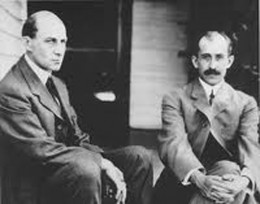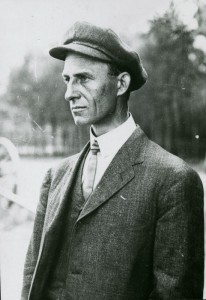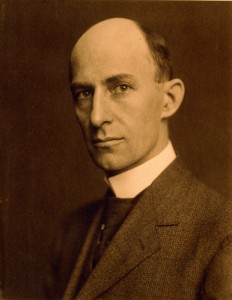Bells tolled and work stopped all over Dayton 100 years ago on June 1 as the city observed the untimely death of one of its most famous sons, Wilbur Wright.
Wilbur, co-inventor of the airplane with his brother Orville, had passed away from an illness early on the morning of May 30, 1912. His untimely death at age 45 stunned his hometown and made news around the world.
Dayton-area institutions observed the centennial anniversary of Wilbur’s death at 3 p.m. on Friday, June 1, with a memorial service at his graveside in Woodland Cemetery. Several churches and other institutions joined in the service by tolling bells or observing a moment of silence.
Wright State, the namesake of the Wright brothers, is observing the anniversary with an exhibit about the life of Wilbur Wright created by a team of graduate students in the Public History program. The exhibit is on display at Dayton History in Carillon Historical Park through the end of the year.
“The exhibit is titled ‘Wilbur Wright: A Life of Consequence,’ ” said Dawne Dewey, director of public history and head of Special Collections and Archives. “The exhibit focuses on him as an individual, his character traits, his role as son, brother, uncle, and his legacy.”

Wilbur (left) and Orville Wright seated on the steps of their Hawthorn Street home, June, 1909. Dayton planned and hosted a huge celebration, the Dayton Homecoming Celebration, for their native sons in June in honor of their achievements.
Wilbur and Orville lived in Dayton and invented the airplane in the back of their West Third Street bicycle shop. They tested gliders and their first powered airplane at Kitty Hawk, North Carolina. They patented their invention, went into business, and by 1912 the Wright Company was turning out military and civilian airplanes in its own factory in Dayton and internationally under license.
The airplane would change the world, but Wilbur would not live to see it happen. He fell ill on May 2, 1912, from what his doctor diagnosed as typhoid fever, according to diary entries by the Wright brothers’ father, Bishop Milton Wright. When Wilbur died, the Bishop summed up his time on earth as “a short life, full of consequences.”
Wilbur’s death brought Dayton to a halt. A statement by Woodland Cemetery, which is organizing the anniversary memorial service, said thousands of people lined up to view his body as it lay in state in the First Presbyterian Church in downtown Dayton. At 3:30 p.m., church bells across the city tolled, streetcars and trains stopped and businesses closed as citizens observed five minutes of silence.
Wilbur and his younger brother Orville are inseparable in the story of the invention of the airplane. They worked as one on the problem of controlling a machine in flight.
But it was Wilbur who first took up the challenge, according to Tom D. Crouch, Ph.D., senior curator of aeronautics at the National Air and Space Museum in Washington, D.C., and an authority on the Wright brothers. Speaking in Dayton last year, Crouch said Wilbur initiated the brothers’ study of human flight and led the early experiments.
While the Wright brothers conquered flight as partners, Crouch said, “Without Wilbur Wright, I’m absolutely convinced, they would not have invented the airplane.”



 Wright State’s MBA program ranked among the best for entrepreneurs by Princeton Review
Wright State’s MBA program ranked among the best for entrepreneurs by Princeton Review  Wright State launches institute, endowment to fuel cutting-edge cardiovascular and kidney research
Wright State launches institute, endowment to fuel cutting-edge cardiovascular and kidney research  Wright State Theatre to present the musical ‘The Apple Tree’ in Herbst Theatre
Wright State Theatre to present the musical ‘The Apple Tree’ in Herbst Theatre  R.E.A.C.H. Festival brings celebration of Indigenous peoples to Wright State
R.E.A.C.H. Festival brings celebration of Indigenous peoples to Wright State  Retrospective exhibition by New York painter Simon Carr on display at Wright State’s Stein Galleries
Retrospective exhibition by New York painter Simon Carr on display at Wright State’s Stein Galleries 